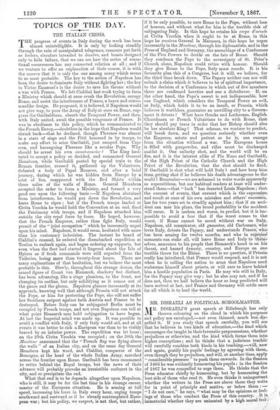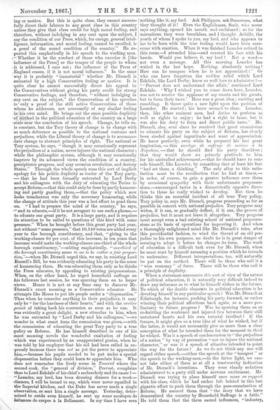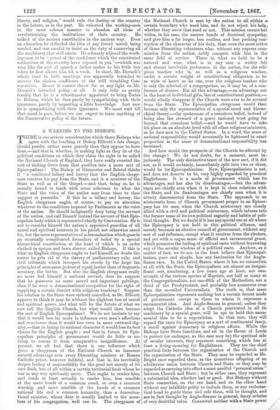AIR. DISRAELI AS POLITICAL SCHOOLMASTER.
jR. DISRAELI'S great speech at Edinburgh has only 1 thrown colouring on the cloud in which his purposes and policy are enveloped,:—not even thinned, much less. dis- pelled it. If you study that speech carefully, you will see that he believes in two kinds of education,—the kind which encourages the taught in theirfavourite prepossessions, whether prejudices or otherwise;and the kind which forms them into. higher conceptions ; and he thinks that a judicious teache`r, will carefully combine both kinds in his teaching,—will, now and again, gratify his pupils' feelings by agreeing with them,- even though they be prejudices, and will, at another time, apply "considerable pressure" to push them onwards. In the Session. of 1866 he was evidently humouring his pupils ; in the Session. of 1867 he was compelled to urge them. He thinks that the Press educates chiefly by humouring, but by humouring the best side of those who read it. He even thinks it unimportant, whether the writers in the Press are above those they write for in point of principle and motive, or below them : — "I do not care," he says, "what may be the opinions or feel- ings of those who conduct the Press of this country. It is immaterial whether they are animated by a high moral feel-s. ing or motive. But this is quite clear, they cannot success- -fully direct their labours to any great class in this country unless they give that class credit for high moral feeling, and :therefore, without indulging in any cant upon the subject, I say the condition of our Press, which, for energy, general intel- ligence, information, and moral feeling, cannot be excelled, is a proof of the sound condition of the country." He re- peated this emphatically in his speech to the working men. .r" Whether it be the conduct of those who exercise it [the .-influende of the Press] or the temper of the people to whom -it is addressed, I care not ; the influence of the Press of .England ceases, if it is not moral influence." In the same -Way it is probably " immaterial " whether Mr. Disraeli is -animated by a high Conservative feeling or motive. It is -quite clear he cannot successfully direct his appeal to the Conservatives without giving his party credit for strong -Conservative feelings, and therefore, "without indulging in -any cant on the subject," the Conservatism of his speeches is• only a proof of the still active Conservatism of those whom he addresses, not necessarily of any similar feeling lulls own mind. He brings out the same possible duplicity Pliethod in the political education of the country on a large reCale near the conclusion of his speech. Change, he tells us, is constant, but the Tory theory of change is to change with -as much deference as possible to the national customs and prejudices, while the Liberal theory of change is to accommo- date change to abstract principles of right. The national or Tory system, he says, "though it may occasionally represent -the prejudices of a nation, never injures the national character ; -while- the philosophic system, although it may occasionally improve by its advanced views the conditibn of a country, precipitates progress, and may occasion revolution, and destroy States." Through the whole speech runs this sort of implicit apology for his politic duplicity as leader of the Tory party, — that he had been formally entrusted by Lord Derby and his colleagues with the duty of educating the Tories to accept Reform,—that this could onlybe done by partly humour- ing and partly goading them,—that the policy which now looks treacherous was -only the necessary humouring, while -the change of attitude this year was a last effort to goad them on. "I had to prepare the mind of the country," he says, ," and to educate,—if it be not arrogant to use such a phrase,— to educate our great party. It is a large party, and it requires its attention to be called to questions of this kind with some ;pressure." When he brought before this great party last year, ..not without "some pressure," that 10,140 votes are added every year to the borough constituency, and that, "giving to the working-classes 60 per cent. of this increase, in ten years that -increase would make the working-classes one-third of the whole • borough constituency,"—adding emphatically, "one-third of the borough constituency seems to me to be rather a fair propor- -tion,"—when Mr. Disraeli urged this, we say, in resisting Lord Russell's Bill, he was evidently educating his party in the sense -of humouring them. He was educating them only as he thinks -the Press educates, by appealing to existing prepossessions. .When, on the other hand, he urged household suffrage on /his followers last session, he was spurring them on to larger Tiews. Hence it is not at any time easy to discover Mr. 'Disraeli's exact meaning as a Conservative educator. He -.attempts like Moses to put his people under a "dispensation." 4Thus when he concedes anything to their prejudices, it may only be "for the hardness of their hearts," and with the arri&e pensde of taking back his concession as soon as he can. It was evidently a great delight, a new stimulus to him, when lie was entrusted by "Lord Derby and his colleagues,"—we wonder in what exact form the commission was given,—with the commission of educating the great Tory party to a true :policy on Reform. He has himself described in one of his -most amusing novels the wonderful exaltation of feeling .-which was experienced by an unappreciated genius, when he vitis told by his employer that his aid had been called in ex- pressly because there was not as yet the power to appreciate .him,—because his pupils needed to be put under a special -dispensation before they could learn to appreciate him. Who -does not remember the lively scene in Tancred where the second cook, the "general of division," Prevost, complains -thus to Lord Eskdale of his chief's melancholy and its cause ?— "Leander, my lord, has been dressing dinners for a week— 'dinners, I will be bound to say, which were never equalled in the Imperial kitchen, and the Duke has never made a single observation, or sent him a single message. Yesterday, deter- mined to outdo even himself, he sent up some escalopes de laitances ds earpes a la Bellamont. In my time I have seen nothing like it, my lord. Ask Philippon, ask Dumoreau, what they thought of it! Even the Englishman, Smit, who never says anything, opened his mouth and exclaimed ; as for the marmitons, they were breathless, and I thought Achille, the youth of whom I spoke to you, my lord, and who appears to me to be born with the true feeling, would have been over- come with emotion. When it was finished Leander retired to this room—I attended him—and covered his face with his hands. Would you believe it, my lord ? Not a word— not even a message. All this morning Leander has waited in the last hope. Nothing, absolutely nothing ! How can he compose when he is not appreciated?" Or who can have forgotten the sudden relief which Lord Eskdale, like Lord Derby, knew so well how to administer ?— " Prevost does not understand the affair,' continued Lord Eskdale. Why I wished you to come down here, Leander, was not to receive the applause of my cousin and his guests, but to form their taste.' Here was a great idea ; exciting and ennobling. It threw quite a new light upon the position of Leander. He started ; his brow seemed to clear. Leander, then, like other eminent men, had duties to perform as well as rights to enjoy ; he had a right to fame, but it was also his duty to form and direct public taste." Mr. Disraeli, also, ever since he received that great commission to educate his party on the subject of Reform, has clearly been steeled against ingratitude and want of appreciation. He knew perfectly, even while he prepared his last great inspiration, -- this escalope de supage de maison i /a Napoleon, — that he should find - his party thankless ; that they would show no princely gratitude to him for his unrivalled achievement,—that he should have to con- sole himself, like Leander, by remarking that at least his feat "had set them a thinking." The only alloy to this satis- faction must be the recollection that he had at times,— in order, of course, to gain a greater influence over them by occasional sympathy with their unfortunate preposses- sions,—encouraged tastes in a diametrically opposite direc- tion to those he really wished to develop. But then he thinks this an essential incident of all true Tory policy. Tory policy is, says Mr. Disraeli, progress proceeding as far as possible in concert with national prejudice. Tory progress may widen, if it can, or gradually deflect, if it can, the groove of prejudice, but it must not leave it altogether. Tory progiess must accept even a bad existing school of national preposses- sions as its basis of operations for improving it. And when a thoroughly enlightened mind like Mr. Disraeli's tries, after this providential fashion, to wind the thread of an old pre- judice to his own purposes, no doubt he is in great danger of seeming to adopt it before he changes its form. The work of education is a difficult task even for Mr. Disraeli, when he must start by himself assuming a position which he intends to undermine. Different interpretations, too, will naturally be put on the method. There will be those who call it a "wise economy of force. There will be those who call it a principle of duplicity. When a statesman announces th's sort of view of the nature of political education, it is naturally very difficult indeed to draw any inference as to what he himself wishes in the future. To which of the double elements in political education is he devoting himself in any particular speech Was Mr. Disraeli at Edinburgh, for instance, pushing his party forward, or rather winning their political affections back again, as a mere pre- liminary to future progress ? Was he spurring them on or re-knitting the weakened and injured ties between their still untutored hearts and his own tutorial intellect? If the former, it might give us a true idea of what he wished, but if the latter, it would not necessarily give us more than a clear conception of what he intended them for the moment to think he wished. Was it a speech of condescension to "the prejudices of a nation" by way of precaution "not to injure the national character," or was it a speech of stimulus intended to point the way for the future ? As we do not think any one will regard either speech,—either the speech at the " banquet " or the speech to the working-men,—in the latter light, we can- not take either of them as at all a trustworthy indication of Mr. Disraeli's intentions. They were clearly sedatives administered to a party still under nervous excitement. Mr. Disraeli was trying to place himself once more en rapport with his class, which he had rather left behind. in this last gigantic effort to push them through the pass-examination of Reform. He assured them that "the story that we have demoralized the country by Household Suffrage is a fable." He told them that the three sacred influences, "industry). liberty, and religion," would rule the destiny of the country in the future, as in the past. He exhorted the working-men in the most solemn manner to abandon all ideas of revolutionizing the institutions of their country. He talked of the ancient constitution in the ancient way. Even on education he ridiculed the idea of any forced march being needed, and was careful to insist on the duty of conserving all the machinery that still exists. He solemnly adjured the work- ing-men to be "proud of the confidence which the constituted authorities of the country have reposed in you "—which was very like the sort of speech a father makes to his little boy when he first allows him 6d. a week. In short, Mr. Disraeli's whole tone in both meetings was apparently intended to recover the shaken confidence of the still trembling Con- servatives. Hence it cannot throw for us any light on Mr.
Disraeli's intended policy at all. It only tells us pretty frankly that he is a schoolmaster appointed to bring Tories to Reform, which he does partly by sympathizing with their ignorance, partly by imparting a little knowledge. Just now he is sympathizing with their ignorance. We must wait till that mood is past, before we can expect to learn anything of the Conservative policy of the future.
































 Previous page
Previous page